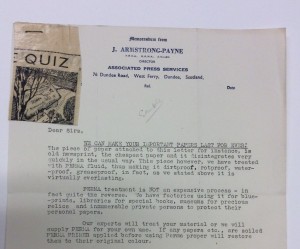Our conservation volunteers have been doing a fantastic job over the past months surface cleaning, repairing and re-housing the Library Correspondence from the University’s archive collection. There have been many interesting pieces uncovered during this work, but one such item in particular caught our eye, namely an advertisement for conservation services – 1940s style!
This advert for ‘PERMA’ treatment and its claims that it can make your important papers last forever with its “dirtproof, rotproof, waterproof, greaseproof” qualities just goes to demonstrate how far conservation has developed from the 1940s to the present day. Although the attached treated sample piece does certainly appear to have lasted the years (although whether it is “everlasting” awaits to be seen…) it is not a treatment method that we would employ today. Ethical considerations and guidelines, are much more ingrained in the modern-day conservation profession with the physical, historical and aesthetic integrity of the object now being placed at the forefront of our decision making. Alongside the development of the conservation profession, comes a greater understanding of the methods and materials that we use, allowing us to make much more informed decisions regarding appropriate treatment options. Two of the main principles that we work towards are the concepts of minimal interventive treatment and reversibility (ideas that are not particularly compatible with ‘PERMA’ treatment). This ensures that the risk of introducing anything which may adversely affect the object is kept to a minimum, whilst allowing for the chance that new, improved, techniques and materials may be developed in the future. However sound these principles may be, it can only go so far, for example, surface cleaning – although important – would not be necessarily be considered reversible and therefore must be taken into account when deciding on a treatment plan.
It is certainly apparent that our conservation priorities have changed over the years, and there are a few things which should perhaps stay in the past…
Post by Emma Davey, Conservation Officer

